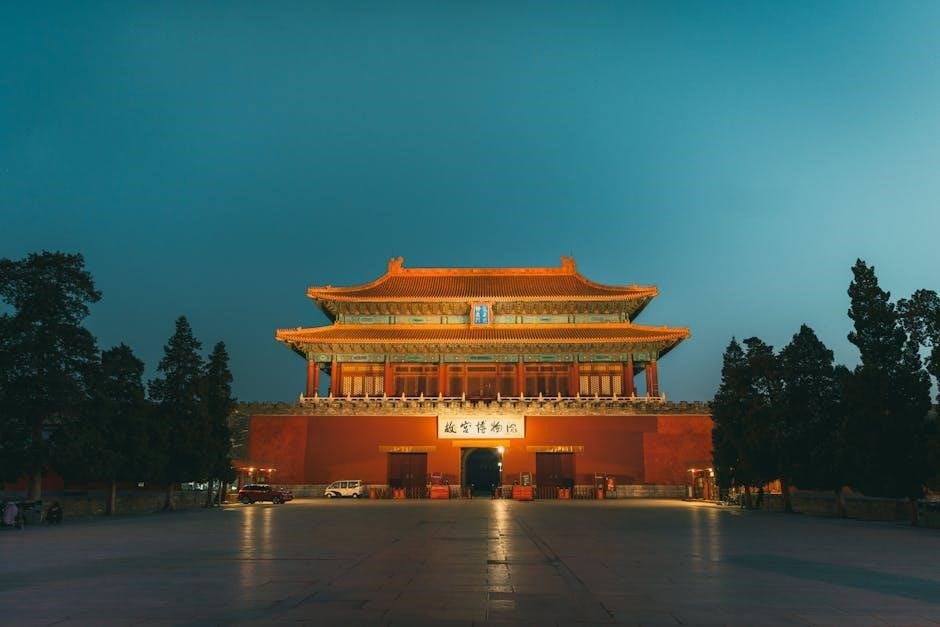Julie Otsuka’s debut novel, When the Emperor Was Divine, explores the internment of a Japanese American family during WWII, blending historical fiction with emotional depth․
1․1 Overview of the Novel
When the Emperor Was Divine is a poignant historical fiction novel by Julie Otsuka, exploring the internment of a Japanese American family during World War II․ The story follows their forced relocation from Berkeley to an Utah desert camp, detailing their struggles, resilience, and emotional toll․ Otsuka’s sparse yet evocative prose captures the harsh realities of wartime injustice and the enduring strength of familial bonds․
1․2 Historical Context of Japanese American Internment
Following the 1941 attack on Pearl Harbor, anti-Japanese sentiment surged in the U․S․ Executive Order 9066, signed by President Roosevelt in 1942, authorized the forced relocation of over 120,000 Japanese Americans to internment camps․ This mass incarceration, justified by fear and prejudice, uprooted families, causing loss of homes, livelihoods, and dignity․ The novel vividly portrays this dark chapter, highlighting its profound impact on Japanese American communities during WWII․
The Historical Background of Japanese American Internment
The 1941 Pearl Harbor attack triggered Executive Order 9066, leading to the forced relocation of Japanese Americans into internment camps, uprooting lives and communities․
2․1 The Impact of World War II on Japanese Americans
World War II triggered widespread fear and suspicion, leading to the forced relocation of over 120,000 Japanese Americans․ Executive Order 9066 resulted in their internment, causing loss of property, livelihoods, and cultural identity․ Families were uprooted, communities shattered, and lives forever altered by the wartime hysteria, leaving lasting emotional and societal scars on Japanese Americans․
2․2 The Role of Executive Order 9066
Executive Order 9066, issued in 1942, authorized the forced relocation of Japanese Americans to internment camps․ This order, justified by wartime fear, led to the evacuation of entire communities, stripping them of their homes and businesses․ The novel highlights the profound impact of this order, which upended lives and erased identities, reflecting the broader themes of injustice and resilience in Otsuka’s narrative․

The Structure and Style of the Novel
When the Emperor Was Divine features a delicate, evocative narrative that unfolds the harrowing experience of a Japanese American family during WWII, blending historical fiction with emotional depth and poetic precision, creating a haunting yet resilient portrayal of their journey․
3․1 Narrative Voice and Perspective
The novel employs a shifting narrative voice, seamlessly transitioning between family members’ perspectives․ This plural narrative approach captures the collective trauma and resilience of the Japanese American family, while maintaining a delicate, evocative tone that underscores the emotional depth of their experiences during WWII․ The perspective shifts enhance the reader’s connection to each character’s personal struggles and growth․
3․2 The Use of Symbolism and Imagery
Otsuka masterfully uses symbolism, such as the Emperor as a distant, divine figure, contrasting with the harsh realities of the internment camp․ Imagery of the desert landscape and the family’s lost home evokes a sense of displacement and longing․ These elements underscore the tension between cultural identity and the imposed realities of war, enriching the novel’s emotional and historical depth for readers․
The Family’s Experience in the Internment Camp
The family endures harsh conditions, adapting to life in the Utah desert camp, grappling with loss, and striving to maintain dignity amid uncertainty and confinement․
4․1 The Father’s Journey and Struggles
The father’s absence and eventual return create profound emotional ripples․ His silence and internalized pain reflect the trauma of separation and imprisonment, as he struggles to reconnect with his family and reclaim his role as a provider, amidst the dehumanizing conditions of the camp․
4․2 The Mother’s Resilience and Sacrifices
The mother’s unwavering strength and selflessness anchor the family amidst chaos․ She silently endures the loss of their home and livelihood, prioritizing her children’s well-being while navigating the harsh realities of the camp, exemplifying quiet resilience in the face of profound injustice and displacement․
4․3 The Children’s Struggle with Identity
The children grapple with confusion and alienation, torn between their Japanese heritage and American upbringing․ The camp’s harsh environment intensifies their internal conflict, as they face racial prejudice and displacement․ Their journey reflects the broader struggle of Japanese Americans to reconcile dual identities, seeking belonging in a nation that rejects them, and finding resilience in the face of cultural erasure and alienation․
Themes in “When the Emperor Was Divine”
The novel explores identity, memory, and resilience, delving into the tension between cultural heritage and American assimilation, while highlighting the emotional toll of displacement and injustice․
5;1 The Concept of Identity and Belonging
The novel delves into the internal and external conflicts of a Japanese American family, exploring their struggle to reconcile their cultural heritage with their American identity․ Displacement and internment amplify feelings of disconnection, as they grapple with loyalty, tradition, and belonging in a hostile environment․ The camp’s harsh conditions and societal prejudice further complicate their search for self and place, reflecting the broader tension between heritage and assimilation․
5․2 The Power of Memory and Silence
Memory and silence serve as dual narratives in the novel, capturing the family’s unspoken grief and resilience․ The mother’s quiet strength and the father’s absence highlight the weight of unexpressed emotions․ Otsuka uses fragmented memories to convey the trauma of internment, while silence acts as both a shield and a burden, preserving dignity amidst loss and injustice․
5․3 The Tension Between Tradition and Modernity
The novel reflects the clash between Japanese traditions and American modernity, as the family struggles to preserve cultural identity amidst displacement․ The mother’s adherence to customs contrasts with the children’s assimilation efforts, highlighting the fragility of heritage in a hostile environment․ The Utah desert camp symbolizes the erasure of their past, while the father’s absence underscores the loss of traditional patriarchal guidance, deepening cultural dislocation․
The Significance of the Title
The title reflects Japan’s cultural reverence for the emperor as a divine figure, contrasting with the harsh realities of wartime internment faced by Japanese Americans․
6․1 The Divine Emperor as a Cultural Symbol
The emperor, as a divine symbol, embodies Japan’s cultural and historical identity, representing continuity and divine legitimacy․ In the novel, this imagery contrasts with the harsh realities faced by Japanese Americans during WWII, highlighting the tension between cultural reverence and personal suffering․ The title underscores the emperor’s symbolic role while reflecting the family’s displacement and resilience․
6․2 The Irony of Divine Leadership in Wartime
The novel highlights the irony of the emperor’s divine status during WWII, as Japanese Americans faced internment despite their cultural ties․ The emperor’s divine image contrasts with the harsh realities of war, revealing the absurdity of racial discrimination․ This duality underscores the emotional and cultural conflict experienced by Japanese Americans, caught between loyalty and persecution․

The Author’s Background and Inspiration
Julie Otsuka, a Japanese American author, holds a BA from Yale and an MFA from Columbia․ Known for works like The Buddha in the Attic and The Swimmers, her debut novel was inspired by her mother’s family experiences during WWII, blending historical fiction with personal narrative․
7․1 Julie Otsuka’s Personal Connection to the Story
Julie Otsuka’s personal connection to the story stems from her Japanese American heritage․ Her mother’s family experienced wartime internment, inspiring the novel․ Born in California, Otsuka draws on ancestral memories, blending historical facts with emotional depth to portray a family’s resilience and struggle with identity during WWII, reflecting her own exploration of cultural duality and historical injustice․
7․2 The Research and Writing Process
Julie Otsuka’s research for When the Emperor Was Divine involved meticulous study of WWII Japanese American internment records and personal accounts․ Her sparse, evocative prose reflects a deliberate choice to convey the emotional weight of the era without embellishment․ The novel’s acclaim underscores her ability to blend historical accuracy with lyrical storytelling, creating a deeply moving portrayal of a family’s resilience and struggle during wartime․

The Novel’s Reception and Reviews
When the Emperor Was Divine received critical acclaim for its poignant portrayal of Japanese American internment, earning awards and resonating deeply with readers as a historical and emotional masterpiece․
8․1 Critical Acclaim and Awards
When the Emperor Was Divine garnered widespread critical acclaim for its powerful portrayal of Japanese American internment․ The novel was praised for its emotional depth and historical significance, earning it a place among bestseller lists and award nominations․ Critics lauded Otsuka’s concise yet evocative prose, while scholars noted its contribution to understanding a dark chapter of American history․ Its availability in PDF has broadened its accessibility, further cementing its impact․
8․2 Reader Responses and Cultural Impact
Readers resonated deeply with the novel’s poignant portrayal of resilience and loss, fostering empathy and dialogue about the internment era․ The PDF version has enhanced accessibility, allowing wider audiences to engage with Otsuka’s powerful narrative․ The book’s cultural impact lies in its ability to illuminate a painful chapter of history, fostering understanding and reflection on identity, injustice, and the human spirit․
The PDF Version and Accessibility
The novel’s PDF version is widely available, offering readers convenient access to Otsuka’s powerful story․ Its digital format ensures easy reading across devices, enhancing accessibility worldwide․
9․1 Availability of the Novel in Digital Formats
The novel When the Emperor Was Divine is widely available in digital formats, including PDF, EPUB, and MOBI, across platforms like Amazon, Google Books, and Project Gutenberg․ Its digital versions ensure accessibility, allowing readers to easily download and enjoy the story on various devices․ The PDF format, in particular, is popular for its clarity and retention of the original text’s formatting, making it a preferred choice for many readers worldwide․
9․2 The Convenience of the PDF Format for Readers
The PDF format of When the Emperor Was Divine offers readers unparalleled convenience, allowing easy access on various devices like smartphones, tablets, and laptops․ Its portability ensures readers can enjoy the novel anytime, anywhere, without the need for physical storage․ The PDF format also preserves the book’s original layout, enhancing readability and making it a preferred choice for many readers seeking a seamless digital experience․
When the Emperor Was Divine remains a poignant exploration of wartime injustice, with its PDF availability ensuring accessibility for modern readers seeking historical insights and emotional resonance․
10․1 The Lasting Legacy of the Novel
When the Emperor Was Divine leaves a lasting impact by shedding light on the overlooked history of Japanese American internment․ Its availability in PDF format has made it accessible to a wider audience, ensuring that the stories and struggles of those affected remain relevant and remembered․ The novel’s emotional depth and historical significance continue to resonate with readers today․
10․2 The Importance of Remembering Historical Injustices
Remembering the injustices of Japanese American internment, as depicted in When the Emperor Was Divine, is crucial for understanding the past and preventing future injustices․ The novel, available in PDF, serves as a poignant reminder of the consequences of fear and prejudice, offering lessons for contemporary society․ By preserving these stories, we honor the resilience of those affected and ensure their experiences are not forgotten․